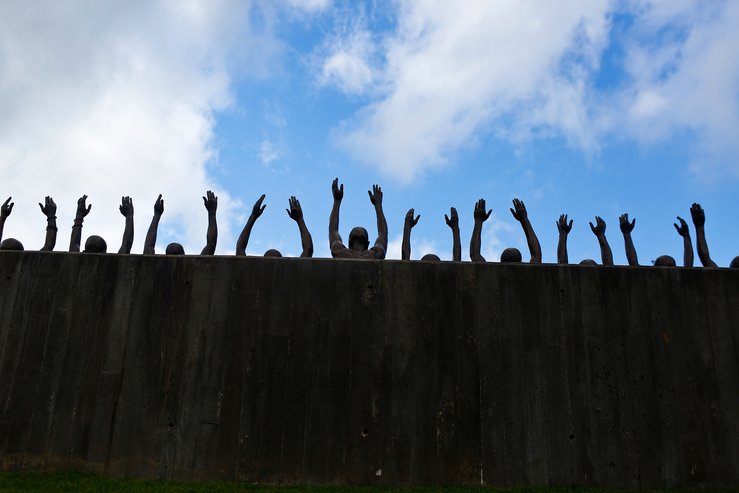Now here is a view by Issac J. Bailey
下面是艾薩克·J.貝利供稿的一篇評論
Learning about lynching helped heal my wounds
了解私刑有助于傷口愈合
IT TOOK ME A LONG TIME BEFORE I REALIZED THAT MY family's struggles had not simply materialized out of thin air—
我花了很長時間才意識到,我家人的掙扎成為現實并非是無中生有——
that although we have rightly never made excuses about our faults,
意識到盡管我們確實從未為自己的錯誤找過借口,
they weren't evidence of ugliness running through our veins.
那些錯誤也不能證明我們的血管里就流淌著丑陋的血液。
My father beat my mother.
我父親打我母親。
My maternal grandfather beat my maternal grandmother.
我外祖父打我外祖母。
Moochie, my hero big brother, murdered a man.
我崇拜的哥哥穆奇殺過人。
My youngest brother, Jordan, is serving 20 years in a federal prison.
我最小的弟弟,喬丹,正在聯邦監獄服刑,刑期是20年。
A nephew who was raised like a brother is in the middle of a 25-year sentence in a state facility.
和我形同兄弟的侄子,在國家監獄服刑,刑期為25年。
Another brother is serving 16 years.
還有一位兄弟被判了16年。
I know now that a sense of shame convinced us as black people to not speak too loudly about our struggles,
我還意識到,羞恥感說服了我們,身為黑人,就不要太大聲地談論我們的艱難,
only to fuel a cycle of violence that led to more shame.
我們這么做最后卻只助長了暴力的循環,繼而又催生出更強烈的羞恥感。
You can't cure a disease you refuse to acknowledge.
你承都不承認的病又怎么治呢?

As I prepared to visit the National Memorial for Peace and Justice and the Legacy Museum,
準備參觀國家和平正義紀念碑和遺產博物館的時候——
both of which opened to the public on April 26 and honor victims of lynching,
兩者都是4月26日開始對公眾開放的,也都是為了紀念私刑的受害者建立的——
I had a reaction I had not anticipated:
我的一個反應是我自己也完全沒有預料到的:
a rage at the unbroken chain that connects slavery to my own life.
對依舊沒有被打破,依然在我的生活和奴隸制之間架起了一座橋梁的枷鎖的憤怒。
Before I read Mary Turner's story in Patrick Phillips' Blood at the Root: A Racial Cleansing in America,
在看到帕特里克·菲利普斯的《血淋淋的根源:美國的種族清洗》一書中關于瑪麗·特納的故事之前,
I didn't know they had lynched us
我不知道他們不僅對我們用了私刑,
and taught us to hate ourselves for not being able to perfectly navigate a terrorized land soaked in slave blood.
還教我們憎惡自己沒能在這片浸泡在奴隸的鮮血之中的恐怖土地上熟練地航行。
In 1918 Georgia, Turner was hung from a tree by her ankles, doused with gasoline, set a fire;
1918年,佐治亞州,特納被拴著腳踝倒掉在樹上,身上被淋了汽油后被點燃了;
her 8-monthold fetus was cut from her belly and stomped upon.
她8個月大的胎兒被從她的肚子里掏下來任他們踐踏。
She was lynched because she demanded justice for her husband, who himself had just been lynched.
她之所以被處以私刑,是因為她想為她丈夫伸張正義,而她丈夫不久前也遭受了私刑。
Countless others died like this because they dared to try to vote and organize black laborers
類似的情況不計其數,因為受害者們敢于為投票,為組織黑人勞工而奮起反抗,
or were deemed "uppity" in their attempts to exercise their rights.
因為他們在行使自己權利的過程中給白人留下了“狂妄自大”的印象。
Many black men hung from trees after being falsely accused of raping white women,
許多被誣告強奸白人婦女,
or for merely speaking to or glancing at them in a way that white men deemed inappropriate.
或僅僅以白人男子認為不恰當的方式與她們交談或看了她們一眼的黑人男子之后都被吊在了樹上。
A twisted hallucination, born of hate, became a justification for murder.
一種仇恨催生的,扭曲的幻覺成了殺人的正當理由。
The rules between right and wrong were always morphing, intentionally illusive.
對與錯之間的規則不斷變化,故意顯得若即若離。
To survive, we told ourselves that talking right or walking right or beating our kids enough to keep them in line
為了生存,我們告訴自己,正確地說話、正確地走路,或者打我們的孩子打到他們聽話,
would convince white people that we too were American, worthy, beautiful.
就能讓白人相信,我們也是美國人,我們有價值,我們也很美。
But we were mistaken.
但我們錯了。
So the shame grew, and we swallowed it.
我們的羞恥感越來越強,我們也繼續選擇了忍氣吞聲。
譯文由可可原創,僅供學習交流使用,未經許可請勿轉載。



